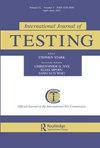Introduction to “Challenges and Opportunities in the Design of ‘Next-Generation Assessments of 21st Century Skills’” Special Issue
IF 1.4
Q2 SOCIAL SCIENCES, INTERDISCIPLINARY
引用次数: 6
Abstract
We are pleased to introduce this special issue of the International Journal of Testing (IJT), on the theme “Challenges and Opportunities in the Design of ‘Next-Generation Assessments of 21 Century Skills.’” Our call elicited manuscripts related to evidence-based models or tools that facilitate the scalability of the design, development, and implementation of new forms of assessment. The articles sought to address topics beyond familiar tools and processes, such as automated scoring, in order to consider issues focusing on assessment architecture and assessment engineering models, with simulated learning and performance contexts, new item types, and steps taken to ensure reliability and validity. The issue’s aims are to enrich our understanding of what has worked well, why, and lessons learned, in order to strengthen future conceptualization and design of next-generation assessments (NGAs). We received a number of submissions, which do just that. The five pieces that constitute this issue were selected not only for their individual contributions but also because collectively, they illustrate broader principles and complement each other in their emphases. The articles illustrate lessons learned in current applications and provide insights to guide implementation in future extensions. Next, we offer thoughts on the challenges and opportunities stated in the call and the role of principled frameworks for the design of NGAs. A good place to begin a discussion of assessment design is Messick’s (1994) three-sentence description of the backbone of the underlying assessment argument:“设计‘21世纪新一代技能评估’的挑战与机遇”特刊简介
我们很高兴地介绍本期《国际测试杂志》(IJT)的特刊,主题是“设计下一代21世纪技能评估的挑战与机遇”。我们的呼吁引发了与基于证据的模型或工具相关的手稿,这些模型或工具促进了新形式评估的设计、开发和实施的可扩展性。文章试图讨论熟悉的工具和过程之外的主题,例如自动评分,以便考虑关注评估体系结构和评估工程模型的问题,具有模拟学习和性能上下文、新项目类型以及确保可靠性和有效性所采取的步骤。本期的目的是丰富我们对行之有效的方法、原因和经验教训的理解,以加强未来下一代评估(NGAs)的概念化和设计。我们收到了很多这样的建议。选择构成本期的五篇文章不仅是因为它们各自的贡献,而且还因为它们共同说明了更广泛的原则,并在重点方面相辅相成。这些文章阐述了从当前应用程序中吸取的经验教训,并提供了指导未来扩展实现的见解。接下来,我们提出了对呼吁中提出的挑战和机遇的看法,以及NGAs设计原则框架的作用。开始讨论评估设计的一个好地方是Messick(1994)对潜在评估论点的支柱的三句话描述:
本文章由计算机程序翻译,如有差异,请以英文原文为准。
求助全文
约1分钟内获得全文
求助全文
来源期刊

International Journal of Testing
SOCIAL SCIENCES, INTERDISCIPLINARY-
CiteScore
3.60
自引率
11.80%
发文量
13
 求助内容:
求助内容: 应助结果提醒方式:
应助结果提醒方式:


